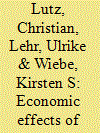| Srl | Item |
| 1 |
ID:
115183


|
|
|
|
|
| Publication |
2012.
|
| Summary/Abstract |
Assuming that global oil production peaked, this paper uses scenario analysis to show the economic effects of a possible supply shortage and corresponding rise in oil prices in the next decade on different sectors in Germany and other major economies such as the US, Japan, China, the OPEC or Russia. Due to the price-inelasticity of oil demand the supply shortage leads to a sharp increase in oil prices in the second scenario, with high effects on GDP comparable to the magnitude of the global financial crises in 2008/09. Oil exporting countries benefit from high oil prices, whereas oil importing countries are negatively affected. Generally, the effects in the third scenario are significantly smaller than in the second, showing that energy efficiency measures and the switch to renewable energy sources decreases the countries' dependence on oil imports and hence reduces their vulnerability to oil price shocks on the world market.
|
|
|
|
|
|
|
|
|
|
|
|
|
|
|
|
| 2 |
ID:
114320


|
|
|
|
|
| Publication |
2012.
|
| Summary/Abstract |
The labor market implications of large investment into renewable energy (RE) are analyzed in this text. Although a growing RE industry can be observed in Germany the overall effect of large increases of RE based electricity and heat generating technologies on the German economy require a careful model based analysis. The applied model PANTA RHEI has been used among others to evaluate the German energy concept in 2010. It takes positive and negative impacts of RE into account. The paper shows the overall effects under different assumptions for fossil fuel prices, domestic installations and international trade. The results are sensitive to assumptions on the development of RE world markets and German exports to these markets. Almost all of these scenarios exhibit positive net employment effects. Under medium assumptions net employment of RE expansion will reach around 150 thousand in 2030. Only with assumptions for German RE exports below today's level, net impacts are slightly negative. Gross employment will increase from 340 thousand in 2009 to between 500 and 600 thousand in 2030.
|
|
|
|
|
|
|
|
|
|
|
|
|
|
|
|